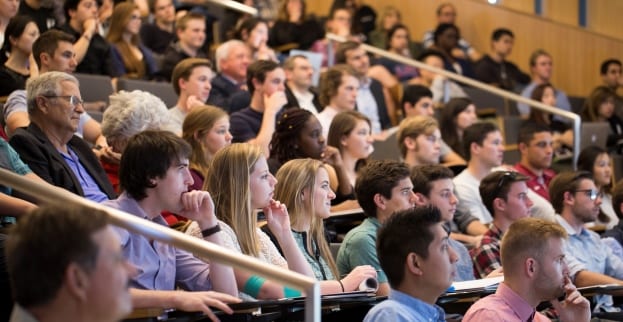

“Do what you love to do and have a can-do attitude,” were words of advice imparted by Tom Mueller, M.S. ’92, to a packed audience of Loyola Marymount University students, faculty, alumni, staff and community members in March 2016.
That philosophy landed Mueller, one of the world’s foremost rocket engine designers, in his current position as propulsion chief technology officer at Space Exploration Technologies, or SpaceX. He is responsible for building and managing an elite propulsion development group whose innovations will facilitate travel to Mars. Mueller was one of the founding members, alongside Elon Musk, who established SpaceX in 2002.
“I’ve always loved rockets,” said Mueller. At a very young age he built power rocket models and was interested in heat engines. For his science fair in 1978, he submitted his project, “Can water injection increase rocket thrust?”
Mueller’s innate curiosity led to an undergraduate degree in mechanical engineering, making him a first-generation college student. He came from a family of Idaho loggers and paid his way through college by logging during summers.
His desire to pursue a career in aerospace brought him to Southern California where he worked at Hughes Aircraft and then with TRW.
To feed his deep-seated interest in rocketry, Mueller joined the Reaction Research Society, where he developed a 50 pound thrust engine using liquid oxygen and kerosene as the propellants. “This was possibly the smallest liquid oxygen rocket ever flown,” Mueller said of the project that also served as his LMU master’s thesis. Through his amateur rocketry work with the society, Mueller met Elon Musk.
“I was always interested in starting up a rocket company,” Mueller said. He came across a few opportunities, “but they never had the complete package. Elon had the right talent, the right ideas and the funding, which allowed me to follow my dream of rockets.”
Just a few months after meeting, SpaceX was founded with its historic goal of building reusable rockets to drastically reduce the cost of space travel, and ultimately facilitate interplanetary travel.
Since then, Mueller has been at SpaceX’s propulsion helm, helping to usher in significant accomplishments for the company. He led the development of the Merlin rocket engine, the highest-performing US-made hydrocarbon engine and the first American hydrocarbon booster engine built in 40 years.
Mueller earned his master’s degree in mechanical engineering from LMU in 1992. In 2013, he delivered the commencement address to LMU’s graduate division and also received an honorary doctorate from the university. This was a year after SpaceX became the first private company to dock and deliver a payload to the International Space Station. He earned his bachelor’s degree from the University of Idaho in 1985.



